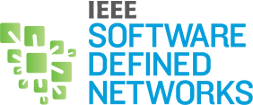IEEE SDN eLearning Modules
IEEE SDN now offers a collection of online courses in the field of Software Defined Networking, Network Function Virtualization, and related technologies. Learn from industry experts about topics that include the fundamentals of SDN and NFV, security and management challenges, the latest SDN open source platforms, and more. Participants also have the opportunity to earn Continuing Education Units (CEUs) and Professional Development Hours (PDHs) with each course.
Available Courses:
ONOS
Courses in the ONOS series include:
ONOS Module 1: An Introduction to Software Defined Networking (SDN)
Length: 1 hr | Earn 1 PDH / 0.1 CEUs
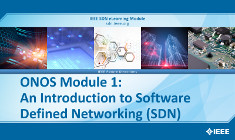
The IEEE Software Defined Networks’ eLearning Module “An Introduction to Software Defined Networking (SDN)” is the 101 module in this series and covers some basic technologies and concepts to provide the foundation for the upcoming modules. By the end of SDN 101, participants will have: Taken a look at networking past, and discovered that it lives on in the future; An understanding of the evolution of SDN and how it fits onto the networking landscape; An understanding of the basic architectures of SDN. We will put the pieces and layers together. This is to lay the groundwork for the next module: SDN 102. Finally, a brief look at the Open Source communities’ invaluable contribution to SDN and how this drives innovation, disruption and sometimes chaos.
Access this course at the IEEE Future Directions Resource Center
ONOS Module 2: An Introduction to Software Defined Networking (SDN) Part 2
Length: 1 hr 10 min | Earn 1 PDH / 0.1 CEUs
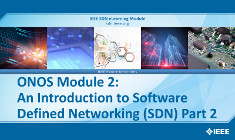
The IEEE Software Defined Networks’ eLearning Module 1 “An Introduction to Software Defined Networking (SDN)” covered traditional networking and its basic terms, and introduced SDN and its fundamental characteristics. In addition, the module provided an overview about OpenFlow and its role in SDN development and adoption. In this second module, participants dig deeper into SDN and related concepts. The Introduction to SDN Module 2 covers: A Review of “Things to Consider.” This is to remind the audience of the context in which SDN exists in the network world; SDN Controllers– An Introduction. Below the surface at the brains of the operation; More on Planes, APIs and Software, the S in SDN; More detail on Open Flow and basic aspects of “OF” functionality. This is a critical component of SDN and merits some deeper exploration during this module; A very brief discussion on miscellaneous “Open Stuff”; Some Common SDN Use Cases; And lastly, how SDN will change networking jobs.
Access this course at the IEEE Future Directions Resource Center
ONOS Module 3: It's All About Control: ONOS SDN Controller
Length: 1 hr | Earn 1 PDH / 0.1 CEUs
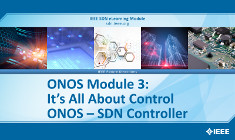
The IEEE Software Defined Networks’ (SDN) eLearning Module 3 “It's All About Control: ONOS SDN Controller” builds on the previous two modules, “An Introduction to SDN: Part 1” and “An Introduction to SDN: Part 2”, which covered SDN and SDN controllers, in general. Module 3 takes a close look at one particular Open Source Controller– the Open Network Operating System (ONOS). This session demonstrates how ONOS fits into the SDN universe; what and how it controls and what problems it solves. In addition, it covers what ONOS brings to the SDN revolution.
Access this course at the IEEE Future Directions Resource Center
ONOS Module 4: ONOS in Action / CORD and ONOS
Length: 1 hr 20 min | Earn 1 PDH / 0.1 CEUs
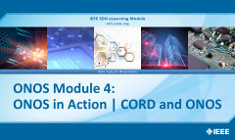
The IEEE Software Defined Networks’ (SDN) eLearning Module 4 builds on Module 3: ONOS SDN Controller which dived into its architecture and features. This module discusses one particular Open Source Controller– the Open Network Operating System or ONOS– in its role as SDN Controller in an SDN based Service Provider Network. The session attempts to answer: Why ONOS?
Access this course at the IEEE Future Directions Resource Center
About the Instructors:
Elena Olkhovskaya is co-founder and CEO of Strategic Virtulization Inc. Elena has over ten years of experience on IT infrastructure and management. Prior to her involvement in ON.LAB community and SDN, Elena specialized in commercial SDN offerings from Cisco, Microsoft and VMware. A major focus has been in the area of cross platform Desktop Virtualization. One of her main interests is in bringing the benefits of SDN to education. Elena has her Doctorate in Philosophy and has several industry certifications. Elena is also a member of the ONOS Teaching Brigade.
Emerson Whatley is a Virtualization and Infrastructure Architect and Principal at Strategic Virtualization, Inc. For the past sixteen years, Emerson has designed and implemented Virtualization and Storage solutions for clients. Emerson has presented on various topics in the field including at Storage World as well as frequently contributing to ON.LAB in the area of the ONOS controller. Emerson is also a graduate of the University of California, Hastings College of the Law and an active member of the Bar. This training has help in the analysis and strategies required to implement current technologies and to predict future directions.
SDN and Security
Courses in the SDN and Security series include:
SDN and Security Module 1: An Introduction to Software Defined Network Security
Length: 40 min | Earn 1 PDH / 0.1 CEUs
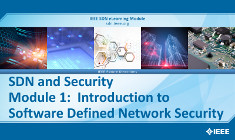
The IEEE Software Defined Networks’ eLearning Module “An Introduction to Software Defined Network Security” is the first of two modules and gives an overview of the subject with a quick reminder of Software-Defined Networking (SDN) and on the Openflow protocol. Then, the session will provide an introduction to a policy model based security framework that is a great fit to SDN. This presentation will also feature the new risks that SDN introduces and how to mitigate those. And lastly, a recent security concept named Software Defined Security where SDN and Network Function Virtualization (NFV) meet.
Access this course at the IEEE Future Directions Resource Center
SDN and Security Module 2: SDN Security Use Cases
Length: 40 min | Earn 1 PDH / 0.1 CEUs
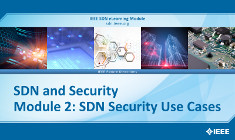
The sequel to IEEE Software Defined Networks’ eLearning Module “An Introduction to Software Defined Network Security,” this second module covers “SDN Security Use Cases.” The presentation highlights some key uses cases in a vast landscape of network security uses cases found in research articles, and in talking to customers and SDN application developers.
Access this course at the IEEE Future Directions Resource Center
About the Instructor:
Bruno Hareng is one of HPE ARUBA EMEA Product Line managers and focuses on Software Defined Networking and Network Security solutions. In that role, he acts as a subject matter expert and evangelist.
Bruno is a regular Lecturer at Grenoble Alpes University (MASTER CYBER DEFENSE), University of Savoie (MASTER TELECOM), Lancaster University in the UK. He did also Lecture at Napier university Edinburgh, EPITA (PARIS) and PARIS Sud Telecom.
His HP career began in 1991 as a research and development engineer for the worldwide PC division. After managing various successful projects in networking and OpenGL graphics, he joined the Kayak marketing team as worldwide product manager for the high-end PC workstation range.
After a couple of years as founder of a startup in the early 2000’s, Bruno joined HP ProCurve in 2004 (now Aruba), as the wireless, security and network management Product manager for EMEA.
Bruno graduated from the ENSIMAG engineering school of Grenoble with an MSc degree in computer sciences and applied mathematics. In addition, Bruno has a degree from the International Marketing Program at INSEAD, Fontainebleau, France.
Open Baton
Courses in the Open Baton series include:
Open Baton Module 1: An Introduction to Network Function Virtualization
Length: 50 min | Earn 1 PDH / 0.1 CEUs
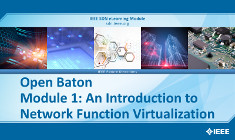
The IEEE Software Defined Networks’ eLearning Module “An Introduction to Network Function Virtualization (NFV)“ covers the context and meaning of NFV and SDN, focusing on the management and orchestration of virtual network functions and their composition in complex network services. Moving from hardware-based appliances towards software-based artifacts requires a complete redesign of legacy network components. Virtualizing a Network Function using virtualization technologies can be easily achieved. This session provides an overview of the ETSI NFV architecture, focusing on the network services management and orchestration aspects, as well as virtualized resource management. Network Slicing in 5G, and Edge Computing, need to be analyzed for addressing requirements at the infrastructure level. An overview about Cloud-Native applications principles and microservices approaches will be given. Those principles are the basis for building highly reliable network services in each of those use cases. This first module will conclude with the benefits and challenges for Network Operators who are currently moving towards this paradigm.
Access this course at the IEEE Future Directions Resource Center
Open Baton Module 2: An Overview of the Open Baton Open Source Framework
Length: 40 min | Earn 1 PDH / 0.1 CEUs
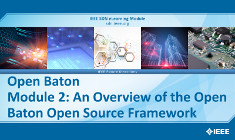
The sequel to the first module which provides an introduction to Network Function Virtualization (NFV), this IEEE Software Defined Networks’ eLearning module offers an overview of the Open Baton Open Source Framework. The module is structured into two major parts. First, it presents the NFV ecosystem as it is today. This part will also cover all the available open source technologies and their architectures which are compliant and relevant in the NFV ecosystem. Second, the module focuses on the Open Baton project: its architecture, functionalities and roadmap are extensively discussed.
Access this course at the IEEE Future Directions Resource Center
About the Instructor:
Giuseppe Carella is a PhD Student at the computer science and electrical engineering faculty of Technical University of Berlin, Institute for Telecommunication Systems, as well as senior solution architect at the Fraunhofer FOKUS institute. He received his M.Sc. in Engineering of Computer Science from the Alma Mater Studiorum University of Bologna in 2011. During his studies he focused on Next Generation Network Infrastructures, especially in IMS services, like presence and messaging. In 2012, he realized one of the first proof of concepts for elastically scaling virtualized network functions. He is responsible for several European and Industrial projects. In 2015, he launched a new open source initiative, Open Baton, providing an extensible and customizable NFV MANO framework, and he is still acting as the project leader.
OpenContrail
The OpenContrail series includes the following course:
OpenContrail Module 1: Contrail: Cloud Network Automation
Length: 30 min | Earn 0.5 PDHs / 0.05 CEUs
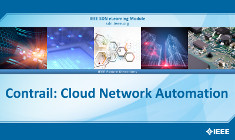
This IEEE Software Defined Networks’ eLearning Module “Contrail: Cloud Network Automation” gives an overview of Contrail, a product of Juniper Networks, and is designed for network administrators, operators and developers. For example, network admins will learn how they can use Contrail, while developers can see how Contrail enables them to consume networks in an abstracted simple and orchestrated fashion. The module will start with looking at the trends and challenges that are prompting enterprises and service providers to implement Contrail; then, examine Contrail’s major features and look at how they fit in with those industry trends and customer challenges.
Access this course at the IEEE Future Directions Resource Center
About the Instructors:
Aniket Daptari, Sr Product Line Manager, Contrail, Juniper Networks. Aniket started as a Software Engineer writing protocol code, CLI, device drivers and online diagnostic software for various networking equipment at different network equipment vendors - Allied Telesyn, Force10 Networks, Cisco Systems. Then he began a journey into network programmability, APIs and SDK at Juniper Networks. Evolved from programmability into platforms for NFV and SDN, this journey evolved from being a Software Engineer to a Technical Marketing Engineer to a Solutions Engineer to a Product Manager. On the education front, Daptari has a Bachelor’s degree in Computer Science from Mumbai, India, a Master’s degree in Computer Science from University of Southern California and a graduate certificate in Management Science and Engineering from Stanford University.
Chaitanya Kadiyala, Product Marketing Manager, Juniper Networks. Chaitanya focuses on cloud software product marketing at Juniper Networks. He has experience in SDN/NFV technologies along with extensive background in big data applications and services. He is passionate about working with technologies and business models that disrupt and transform how enterprises and service providers consume virtualization in the cloud. Before Juniper Networks, Chaitanya worked for four years as a data engineer at Cisco.

